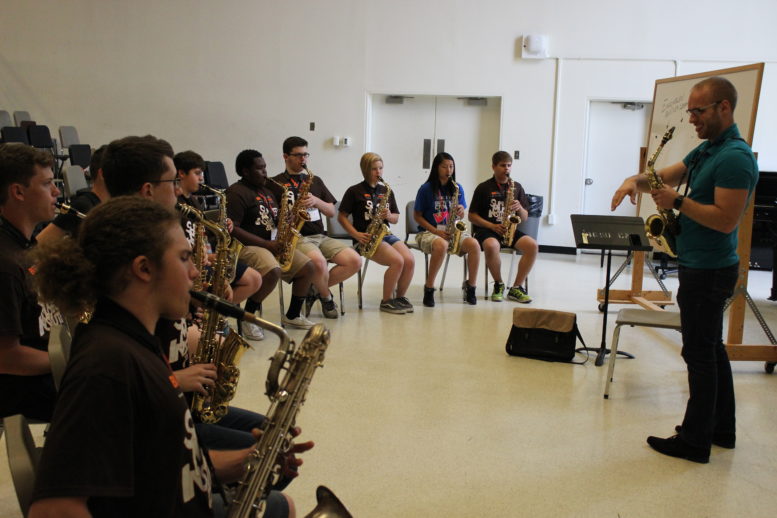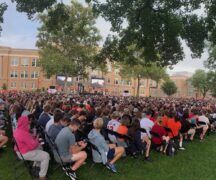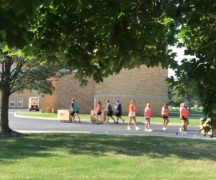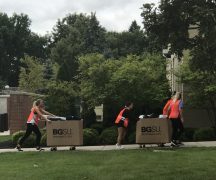By DAVID DUPONT
BG Independent News
The day after Boys State adjourned June 19, closing a 38-year chapter of history at Bowling Green State University, parts of campus were still buzzing.
High school trumpet, horn, trombone and tuba players were putting their mouthpieces to their lips to learn the fine points of brass musicianship.
Down the hall in the Moore Musical Arts Center, saxophones were creating the cacophony of 15 players trying to figure out a Miles Davis lick.
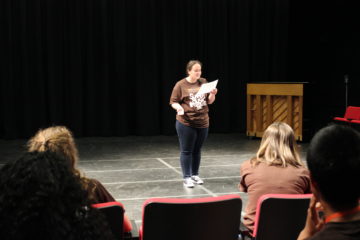
Lauren Lash does a cold reading of a monologue at Musical Theatre Camp at BGSU.
Meanwhile in the Eva Marie Saint Theater in the Wolfe Center for the Arts, young thespians were standing before their peers reading monologues they’d just laid eyes on, often with surprising expression and understanding. As they performed theater professor Michael Ellison guided and encouraged them with and pithy words of advice, hand gestures, and a broad smile.
The decision by the trustees of the American Legion sponsored event to move Boys State and its 1,200-plus delegates to Miami University is a setback in an ongoing effort to bring more people, young and old, to campus over the summer.
“We’re always looking for opportunities to share the university and what it has to offer,” said Dave Kielmeyer, chief marketing and communications officer.
For the past several years arrangements for those camps have been made through the office of Conference and Event Services.
Patrick Nelson, who directs the office, originally arrived on campus as the director of the Bowen-Thompson Student Union, and his job has grown since then. The expansion of his duties makes sense, he said, since the student union is central to so many events on campus.
The Accenture Report, which looked at myriad ways BGSU could save money, recommended in late 2013 that the university centralize its event service functions that had been dispersed in different academic and administrative units.
Nelson said his office was already taking shape when the report came out. “The wheels were already turning,” he said. “We already saw a vision coming together.”
Having Accenture’s stamp of approval helped the new office gain credibility across campus. Someone wanting to set up an event on campus just needs to “make one phone call and we’d take care of all the logistics.”
Nelson was speaking just days before the Boys State trustees voted to leave BGSU. He deferred all comments about that decision to Kielmeyer.
Nelson said his office is trying to get more and more people to consider what BGSU has to offer in the summer. Not all universities are as interested in that business, he said.
This summer, campus will host about 70 camps and academies. Of these, 42 are presented by campus units, which includes the College of Musical Arts’ Summer Music Institute and a variety of sports camps. Others are presented by outside groups.
That includes Environthon, presented at BGSU for the first time by the Ohio Federation of Soil and Conservation Districts. That brought about 100 students and their advisors to campus in June. Another new event, the Ridge Project film camp will bring teenagers to BGSU to produce 30-second spots promoting healthy behaviors.
The summer’s largest conference, with more than 2,000 attendees, the national leadership conference for the Sigma Chi fraternity is held in August right before classes resume.
In between, the campus hosts religious missionaries, cheerleaders, multiple cheerleading camps and sports tournaments.
Nelson said his office is working with Bowling Green High School Men’s Soccer Coach Tim Concannon on the new Bowling Green Summer Soccer Showcase, which would bring teams from across the region. The event has been scheduled in the week between the camps presented by the men’s and women’s soccer program. That will allow players to come early or stay longer to attend one of those camps.
Nelson said some day camps function outside the purview of his office. As soon as a camp involves providing meals and an overnight stay, his office gets involved.
Having a central office as “the face of the university” helps attract groups, Nelson said. His office works to take as much of the burden off those presenting the conference as possible. Guest services, he said, are the day-to-day focus of his offices.
The services and facilities the university have allowed the office to bring in such diverse groups as Sigma Chi and a couple years ago an international jugglers convention, done in conjunction with the city’s Convention and Visitors Bureau.
Then they work with groups to figure out the cost of services they want. Does the group want a catered breakfast? Does a camp want all-you-can-eat meals?
The cost for each Boys State delegate, for example, is $300. A student at the Summer Music Institute pays $525, if registering after April 30.
“It enables us to build a conversation,” Nelson said. “Once we get them here, hopefully we make them want to come back. It takes a heck of lot more work to get them here.”
Nelson added: “In a competitive environment a lot of groups want to move around and see different parts of the state.”
Hosting Boys State, he said, has given the university the experience needed to host such large conferences. Boys State also brought in an “ideal” group of potential students to campus, high achieving high school juniors. “That’s hard to beat,” he said.
In a letter to faculty earlier this month, President Mary Ellen Mazey noted that the incoming freshman class will include 68 former Boys State delegates.
Nelson said he didn’t have numbers on how many students are encouraged to apply to BGSU based on their summer experience on campus.
Lindsay Gross, the manager of public relations for the College of Musical Arts, said she wants to start keeping track of students who attend the Summer Music Institute and those who eventually enroll in BGSU.
William Mathis, now serving as the interim dean after years of teaching trombone, said that he and his fellow brass faculty calculate about 30 percent of the students in the brass camp end up attending BGSU. That’s three to five students a year.
The institute brings in about 160 students for its eight camps – brass, strings, double reeds, piano, voice, musical theater, saxophone and recording arts. The camps are taught by college staff, faculty and graduate students.
How much those attending camps and tournaments get the “full university experience” varies, Nelson said. A baseball player participating in a tournament may not see much of campus, he said, but still would have the excitement of playing on a Division I field.
University enrollment, he noted, has been on an upswing the past two years. “We’d like to think we’re a portion of that.”

